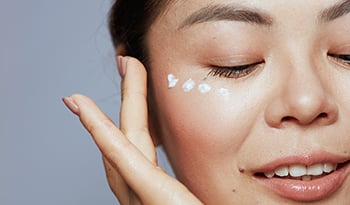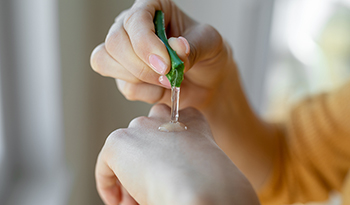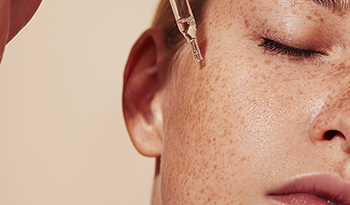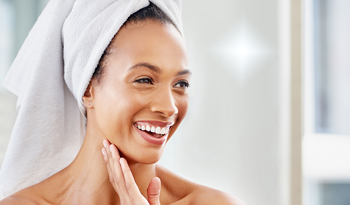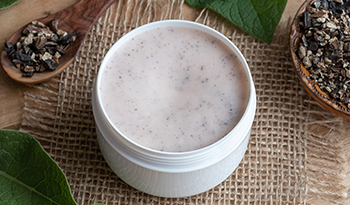Πρέπει να χρησιμοποιήσω προβιοτικά στην περιποίηση της επιδερμίδας μου.
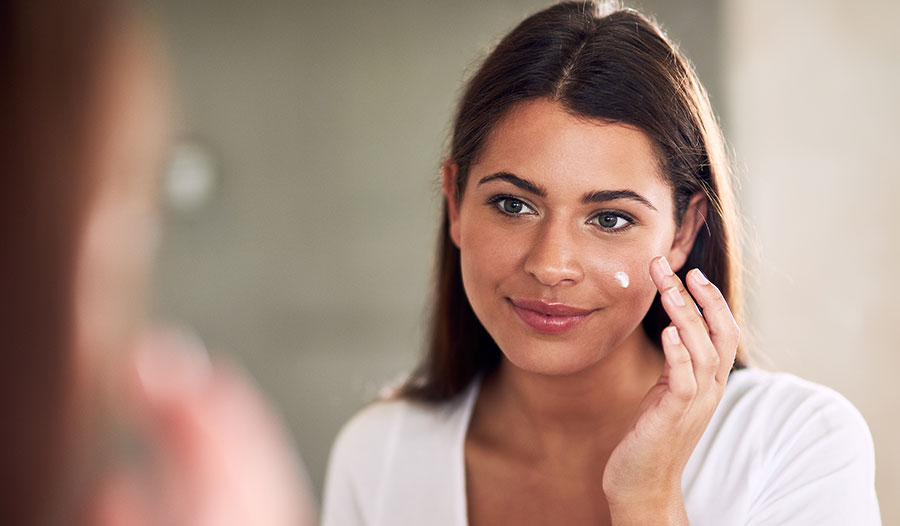
Η παρακολούθηση των αποτελεσμάτων της περιποίησης δεν είναι εύκολη υπόθεση και η αποκρυπτογράφηση των γεγονότων για την περιποίηση της επιδερμίδας από τη φαντασία μπορεί να είναι ιδιαίτερα αποθαρρυντική για τους ασθενείς. Εδώ είναι που βλέπω το παιχνίδι ως δερματολόγος - η δουλειά μου είναι να εφαρμόζω ιατρική βασισμένη σε αποδείξεις, είτε θεραπεύοντας την εξέταση είτε βοηθώντας στην αντιμετώπιση των προβλημάτων προστασίας και περιποίησης του σώματος ενός ασθενούς.
Σήμερα θα εξετάσω μια από τις πιο καυτές νέες τάσεις στην περιποίηση της επιδερμίδας -τα τοπικά προβιοτικά- αλλά πριν προσπαθήσετε να ανακαλύψετε ένα βαζάκι ελληνικό γιαούρτι για να εντοπίσετε το σώμα σας στο όνομα του σύγχρονου κινήματος, επιτρέψτε μου να αναλύσω τι γνωρίζω σήμερα για το ρόλο των προβιοτικών στην περιποίηση της επιδερμίδας και να επισημάνω μερικά βασικά προϊόντα που μπορείτε να χρησιμοποιήσετε για να διορθώσετε ορισμένες κοινές ανησυχίες του σώματος.
Τι είναι τα προβιοτικά και τα πρεβιοτικά - και γιατί τα λέμε αυτά;
Ας ξεκινήσουμε με κάποια βασικά στοιχεία. Όλοι έχουμε μια αίσθηση για τα προβιοτικά, αλλά τι ακριβώς είναι και πώς διαφέρουν από αυτά. Θα πρέπει πρώτα να ξεκινήσουμε με την ίδια έννοια: το σώμα μας κατοικεί από διάφορους μικροοργανισμούς, συμπεριλαμβανομένων των βακτηρίων, των ζυμομυκήτων και των ιών. Η σύνθεση και η αλληλεπίδραση μεταξύ αυτών των οργανισμών ονομάζεται μικροβίωμα. Είναι αναπόσπαστο στοιχείο για τη διατήρηση της ομοιότητας ή της ισορροπίας στο σώμα μας, ιδιαίτερα όταν πρόκειται για το σύστημα υγείας. Μια ανισορροπία μεταξύ καλών και επιβλαβών βακτηρίων, για παράδειγμα, μπορεί να οδηγήσει σε καταστάσεις ασθένειας.
Τα προβιοτικά είναι εμφανή μικροοργανισμοί (βακτικά) που, όταν προσλαμβάνονται σε κατάλληλα τρόφιμα και συμπληρώματα διατροφής, χρησιμεύουν για την παροχή οφελών στην υγεία. Τα γνωστά τρόφιμα που περιέχουν φυσικά αυτά τα «καλά» βακτήρια είναι το γιαούρτι, το kimchi, το ξινολάχανο, το ψωμί και το κομπούχα. Τα πρακτικά είναι ουσιαστικά λιπαρές ουσίες σε φυτικές ίνες που λαμβάνουμε από τη διατροφή μας (σκεφτείτε: φρούτα, θρεπτικά συστατικά, σπέρματα), τις οποίες θεωρούμε ως άνθρωποι δεν μπορούμε να χωνέψουμε, αλλά οι οποίες τροφοδοτούν καλά τις ακτίνες του εντασμένου μας. Η χρήση των προβιοτικών στην ιατρική προήλθε από την ιδέα ότι η προώθηση της ανάπτυξης καλών βακτηρίων θα βοηθήσει στη διατήρηση της ομοιογένειας απέναντι στους γενετικούς και καθημερινούς περιβαλλοντικούς παράγοντες που έχουν τη δυνατότητα να διαταράξουν αυτήν την κατάσταση.
Ποια είναι όλα τα προβιοτικά και τα πρεβιοτικά στην περιποίηση της επιδερμίδας;
Οι μελέτες έχουν αποδείξει ότι το εντερικό μικροβίωμα παίζει ρόλο στη ρύθμιση της ρευστότητας όχι μόνο στο εσωτερικό, αλλά και στο δέρμα! Στον τομέα της δερματολογίας και της φροντίδας του σώματος, η υπερανάπτυξη ορισμένων βακτηρίων και ζυμομυκήτων έχει εμπλουτιστεί για την ακμή, τη ροδόχο ακμή, την ανίχνευση, την πίεση και πολλά άλλα - για να μην αναφέρουμε τον ρόλο που διαδραματίζουν τα βακτήρια στην πρόκληση αντιμετώπισης, ιδίως σε άτομα με υποκείμενες παθήσεις όπως η έκζωση που προκαλεί σε ένα ξηρό, κατακόρυφο δερματικό δέρμα. Η ενασχόληση με τη χρήση των προβιοτικών και πρεβιοτικών από τους χορηγούμενους για την προώθηση ενός υγιούς μικροβιώματος του εντατικού είναι έντονα εδώ και σε καιρό, αλλά έχει αυξηθεί το ενδιαφέρον για τη χρήση τοπικών προβιοτικών και πρακτικών με την ελπίδα ότι και αυτό θα οδηγήσει σε όφελος για την υγεία σας μέσω της ενίσχυσης της ανάπτυξης καλών βακτηρίων που ζουν στο δέρμα μας.
Τα προβιοτικά έχουν εξελιχθεί σε ορισμένες μελέτες που διαδραματίζουν ρόλο στην καταπολέμηση των σημείων επήρανσης του σώματος βοηθώντας στην αποκατάσταση του όξινου pH του σώματος, στην ανακούφιση από το οξειδωτικό στρες, στη βελτίωση της λειτουργίας του δερματικού φραγμού και στη μείωση της επιθετικότητας της φωτοβολίας (σκεφτείτε τις ρυτίδες, τις ηλιακές κηλίδες και τη μείωση του προστατευτικού ιστού) λόγω της ηλιακής βλάβης που προκαλείται από την υπεριώδη ακτινοβολία UVB. Μια μελέτη, συγκεκριμένα, σημείωσε σημαντική βελτίωση της σοβαρότητας του βάθους των ρυτίδων και της υπερμελάγχρησης στα τμήματα της μελέτης που έλαβαν υψηλές τοπικές συγκεντρώσεις της προβιοτικής φόρτισης!
Sidebar: Εδώ είναι που πρέπει να απογοητεύσω την παρόρμηση να μην ξεφύγω από το θέμα για να κατανοήσω τα οφέλη των ανώνυμων και των ανυπολόγιστων ενδυμάτων (επειδή η δοκιμή της βλάβης που προκαλείται από την υπεριώδη ακτινοβολία θα είναι πάντα τα βήματα #1, #2 και #3 για μένα). Τα πρώτα δεδομένα, αν και δεν έχουν σχεδόν τα ίδια ισχυρά αποδεικτικά στοιχεία πίσω από τα προβιοτικά που έχουμε για τα αντηλιακά, δεν αποτελεί έκπληξη του γεγονότος ότι αυτά τα πολλά υποσχόμενα πρώτα αποτελέσματα αντισύλληψης έχουν οδηγήσει σε μια ταχεία αύξηση της δημοτικότητας των τοπικών προβιοτικών.
Ποια είναι ορισμένα προϊόντα που περιέχουν προβιοτικά ή πρεβιοτικά;
Πιθανότατα, απλά ξέρετε τώρα τι είναι τα βιοτικά και τα προβιοτικά, αλλά ποια προϊόντα υπάρχουν πραγματικά εκεί έξω και πώς μπορώ να τα ενσωματώσω στην περιποίηση της επιδερμίδας μου. Για την καλή σας τύχη, λόγω της πρόσφατης αποκρύπνισης της δημοτικότητας τους, υπάρχουν πολλά προϊόντα για να επιλέξετε ανάλογα με τις ανάγκες και τις ανησυχίες σας για την περιποίηση της επιδερμίδας της λίπανσης. Προσθέστε μερικές από τις επιλογές μου:
Ενυδατικές κρέμες
Μια καλή ενυδατική αίσθηση είναι το απόλυτο βασικό συστατικό κάθε περιποίησης της επιδερμίδας. Οι ενυδατικές κρέμες βοηθούν στη διατήρηση της υγρασίας της επιδερμίδας σας (διαισθητική, ας πούμε) και βοηθούν επίσης στη βελτίωση ορισμένων σημείων επήρανσης (ξηρότητα, θαμπάδα, λεπτές γραμμές). Εδώ είναι μια ενυδατική κρέμα που έχει προβιοτικά για να σκεφτείτε να την προσθέσετε στην ενυδάτωσή σας: Hero Cosmetics Clear Collective Clarificating Prebiotic Moisturizer.
Λαμπρυντική επιδερμίδα
Τα προϊόντα περιποίησης των μαρκών γίνονται όλο και πιο έξυπνα, αναγνωρίζοντας ότι τα τρόφιμα θέλουν να χρησιμοποιήσουν σκευάσματα με το μεγαλύτερο δυνατό αποτέλεσμα για το δολάριο που κερδίζει με την επιθυμία. Όλα τα περισσότερα προϊόντα συνδυάζουν έξυπνα συστατικά όπως το σώμα C και τα αντιοξειδωτικά νιασινωμένα σε ένα ισχυρό πλεονέκτημα που απευθύνεται σε πολλαπλές δερματικές ανησυχίες. Θέλετε μια ενυδατική αίσθηση που να έχει προβιοτικά και να διαθέτει επιπλέον φωτεινές ιδιότητες για την αύξηση της λάμψης του σώματος και την καταπολέμηση της μυρωδιάς της. Μην ψάχνετε άλλο:
Derma E Vitamin C Renewing Hydratment with Probiotics and Rooibos - Αποκόψτε τα οφέλη από την προσθήκη της βιταμίνης C, διαμορφωμένη εδώ σε μια σταθερή, ήπια μορφή - φωσφορικό ασκορβύσιο νατρίου. Άλλα πλεονεκτήματα περιλαμβάνουν το γεγονός ότι είναι 100% vegan και χωρίς σκληρότητα.
Derma E Vitamin C Intense Night Cream - Σε αντίθεση με την ενυδατική αναζωογόνηση της βιταμίνης C, η κρέμα νύχτας με βιταμίνη C της Derma E διαθέτει φωσφορικό ασκορβικό υλικό, 100% vegan και χωρίς σκληρότητα σύνθεση που ταιριάζει καλύτερα στη νυχτερινή χρήση.
Andalou Naturals Renewal Cream Probiotic +C Brightening - Αυτή η vegan και χωρίς σκληρότητα επιλογή έχει μια έντονη μυρωδιά μυρωδιάς και έχει τη μορφή C με τη μορφή σταθερής φωσφορικής ασκορβικής μαγνησίας.
InstaNatural Hyaluronic Oil Free Moisturizer - Για απόλυτη ενυδάτωση και λάμψη, σκεφτείτε αυτή την ενυδατική κρέμα χωρίς σκληρότητα που έχει τόσο υαλουρονικό όσο και υγρό C. Λίγο πηγαίνει πολύ μακριά από αυτό!
Λειτουργεί τα προβιοτικά στα προϊόντα περιποίησης του σώματος.
Γνωρίζουμε πολλά, αλλά όχι πάντα, για το πώς λειτουργεί η μικροβίωση του σώματος και χρειαζόμαστε περισσότερες ουσίες για να κατανοήσουμε ποιοι είναι πιο πιθανό να ωφεληθούν από τα τοπικά προβιοτικά. Είναι εύκολο να υποθέσουμε ότι αυτός θα είναι ένας ενεργός ερευνητής για τα επόμενα χρόνια και θα είναι εξαιρετικά συναρπαστικό το γεγονός ότι τα ζωντανά, προορατικά και προορατικά νέα προϊόντα συνεχίζουν να κυκλοφορούν στην αγορά για να δώσουν στους ασθενείς τους και να θεραπεύσουν μια ευρύτερη γκάμα επιλογών όσον αφορά το δέρμα τους.
Αναφορές:
- Byrd, A., Belkaid, Y. & Segre, J. Το φυτικό μικροβίωμα του σώματος. Μικροβιόλη Nat Rev 16, 143-155 (2018). https://doi.org/10.1038/nrmicro.2017.157
- Έλις ΣΡ, Νγκουέν Μ, Βον ΑΡ, Νοτάι Μ, Μπέρνι WA, Σαντού Σ, Σιβαμάνι ΡΚ. Το μικροβίωμα του σώματος και του εντατικού σώματος και ο ρόλος του στις κοινές δερματολογικές παθήσεις. Μικροοργανισμοί. 11 Νοεμβρίου 2019; 7 (11) :550. doi: 10.3390/μικροοργανισμοί7110550. ΠΟΣΟΣΤΌ ΜΈΤΡΗΣΗΣ: 31717915; ΨΜCID: PMC6920876.
- Γαλλία Κ: Μια συνοδευτική ανασκόπηση. Δερματοόλη Θερ (Χαϊδελμπ). 2021 Φεβρουάριος 11 (1): 71-77. doi: 10.1007/s13555-020-00476-7. Epub 2020 19 Δεκεμβρίου. ΔΕΊΚΤΗΣ ΜΈΤΡΗΣΗΣ: 33340341, ΣΜΣΙΔ: PMC7859136.
- Νοτάι Μ, Σάρικ-Μποσανάκ Σ, Βον ΑΡ, Ντάλιγουαλ Σ, Τριβέντι Μ, Ράιτερ PN, Ράιμπακ Ι, Λι CC, Βάις ΛΒ, Αμπρότζιο Λ, Μπέρνι W, Σιβαμάνι ΡΚ. Η χρήση του τοπικού Nitrosomonas eutropha για την αισθητική βελτίωση των ρυτίδων του προσώπου. J Κοσμέτ δερματολ. 2020; 19 (3): 689-93. https://doi.org/10.1111/ jocd.13060.
- Scharschmidt, T.C. &Fischbach, M.A. Τι ζει στο δέρμα μας: οικολογία, γονιδιωματική και θεραπευτικές ευκαιρίες του μικροβιώματος του δέρματος. Φάρμακο Ντίσκοφ. Σήμερα Δεκέμβριος. Μηχανισμός 10, ε83-ε89 (2013).
- Σάρμα Δ, Κόμπερ ΜΜ, Μπόου WP. Αντιγηραντικές επιδόσεις των προβιοτικών. J Φάρμακα Δερματοόλη. 2016; 15 (1): 9-12
ΑΠΟΠΟΙΗΣΗ ΕΥΘΥΝΗΣ:Αυτό το Κέντρο Ευεξίας δεν προορίζεται να παρέχει διάγνωση...
















































































 Πίνακας περιεχομένων
Πίνακας περιεχομένων




